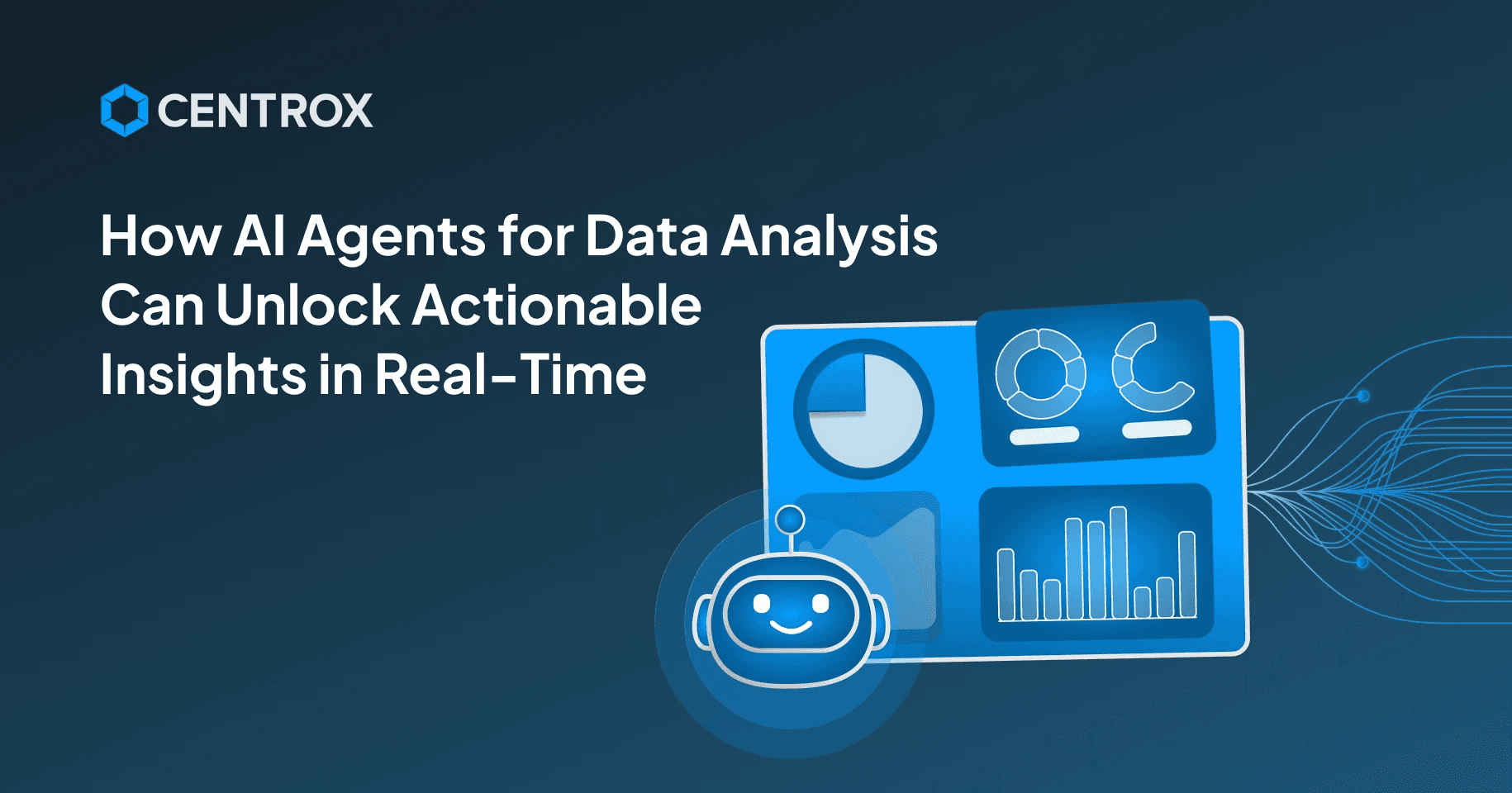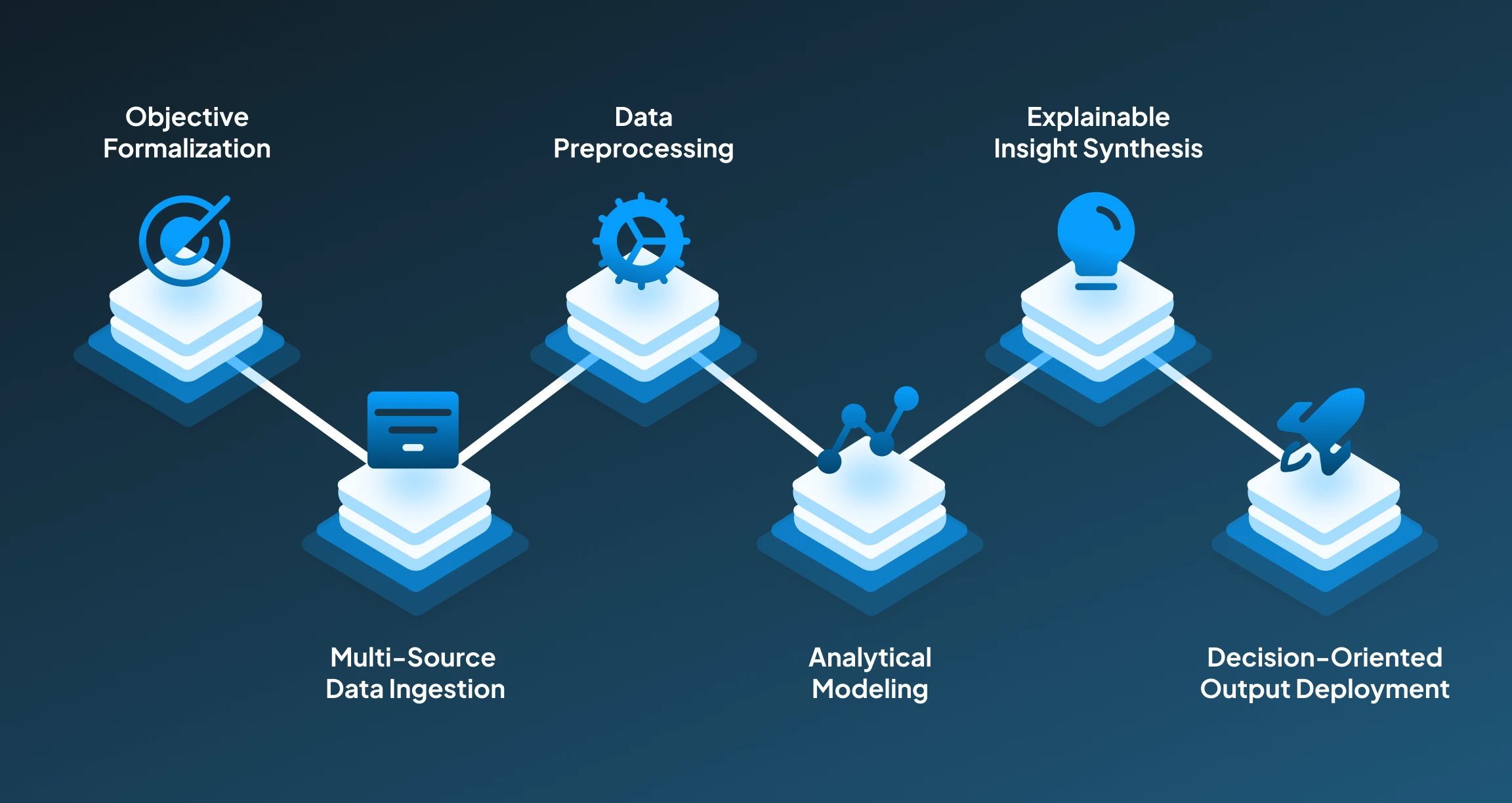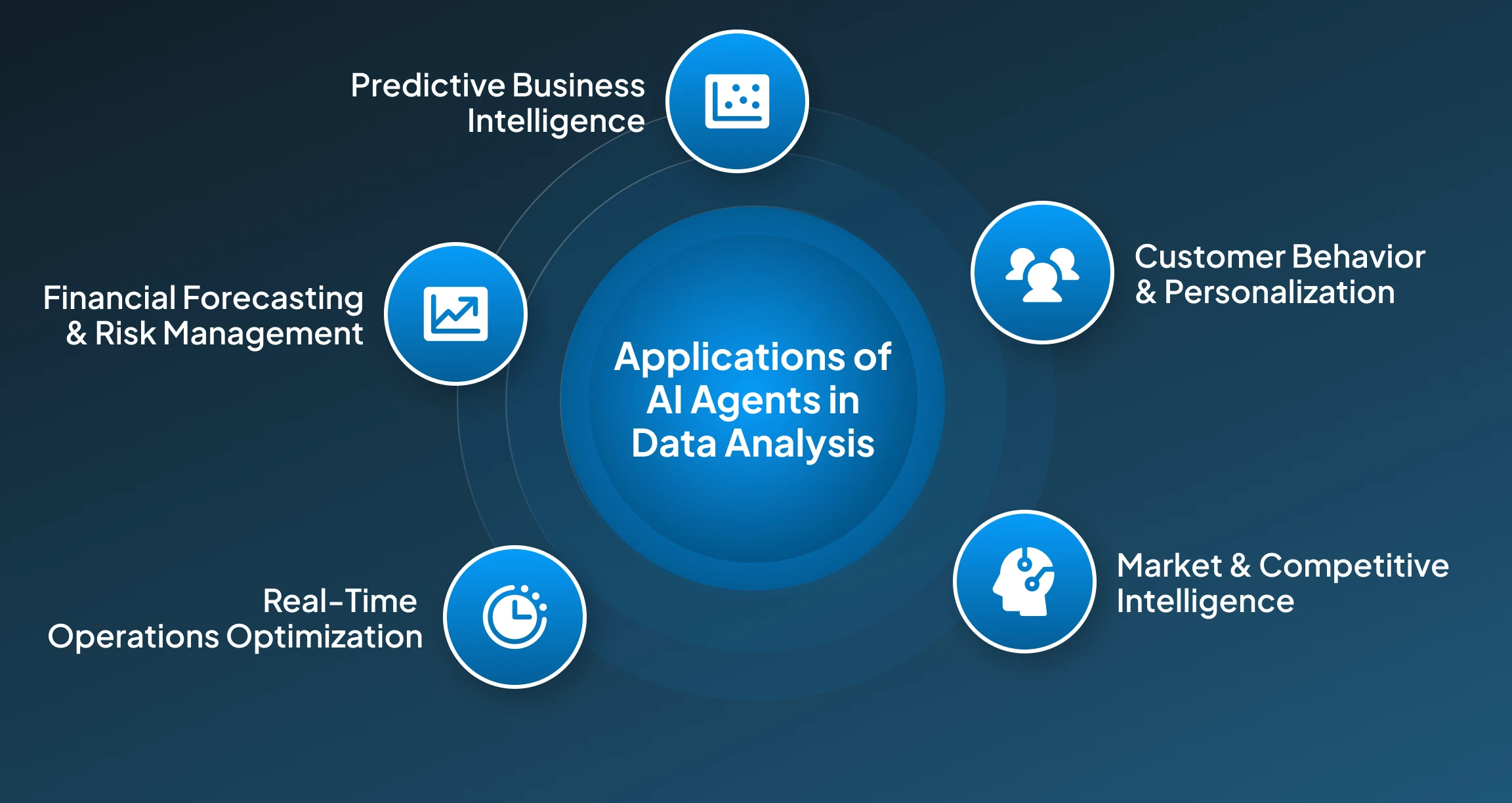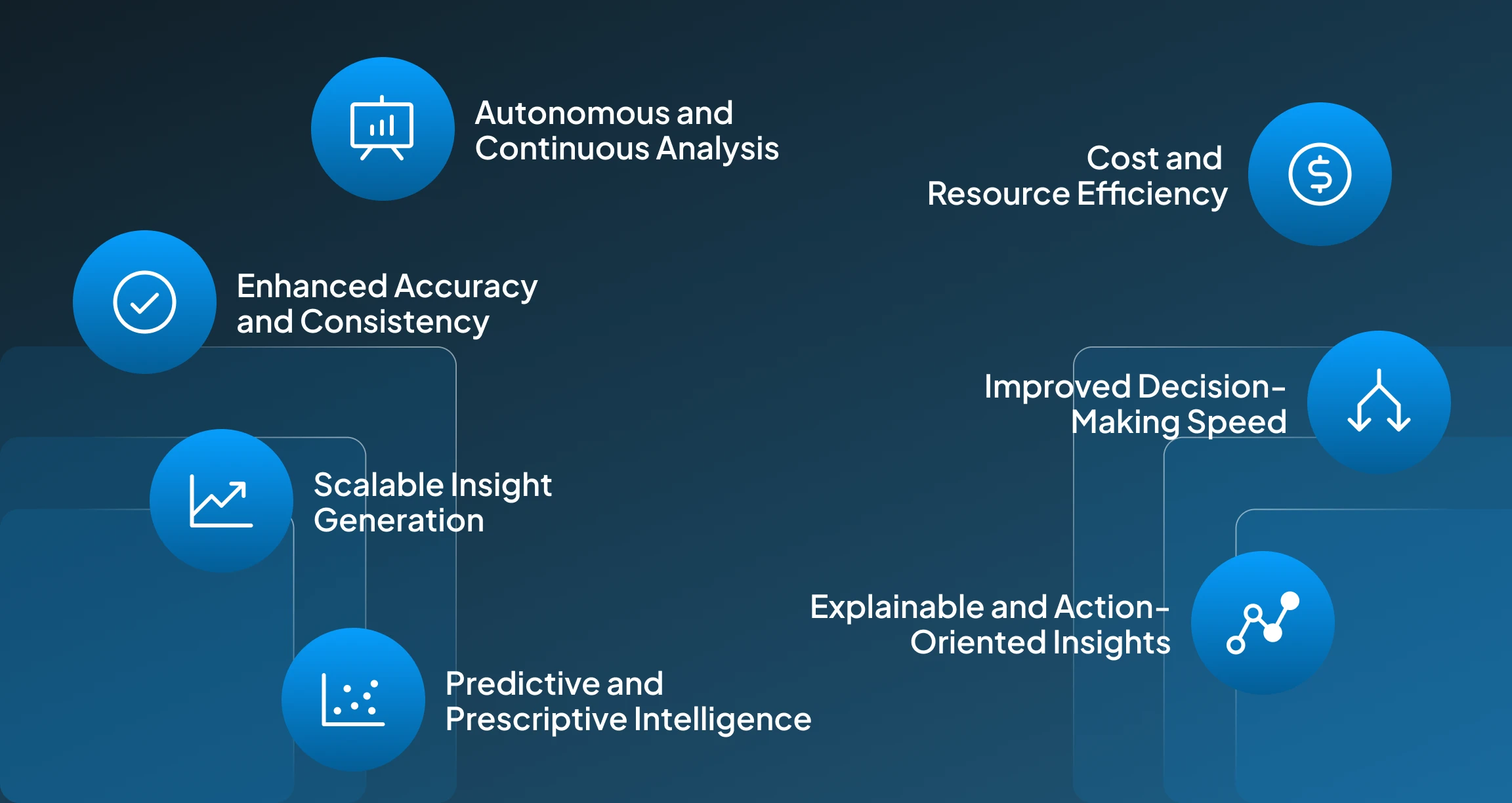How AI Agents for Data Analysis Can Unlock Actionable Insights in Real-Time?
Explore how AI for Data Analysis work, its importance, benefits, and limitations to help make intelligent business decision driving growth and revenue.
9/19/2025
artificial intelligence
10 mins

Evolving trends and customers' demands constantly keep businesses on their toes, requiring them to strategize plans that maintain their autonomy. Data analysis has definitely given businesses a competitive edge in planning intelligent business strategies. With the AI revolution, we can now anticipate the smart assistance of AI agents for data analytics responsibilities.
AI agents for data analytics aren't just an idea for performing data collection, cleaning, and filtering; rather, their advantages go beyond that. These AI agents for data analytics can understand and analyze data patterns to identify anomalies, make predictions, and ultimately aid in framing a well-thought-out business strategy.
In our article, we will make it clear how implementing AI agents for data analytics can help your business experience profit growth. In this, we will cover all the required aspects, from why it's important, its methodology, applications, advantages, and limitations, so that you know all the required information before planning implementation.
Why is AI agent-driven Data Analysis Important?
Today, having the ability to understand and comprehend quality data can provide you competitive advantage. The businesses ignoring this aspect are missing out on a major opportunity, which they will regret in the future.
Having said that, it's totally understandable that performing data analytics requires domain expertise, which further adds cost for having resources dedicated to it. Here, implementing an AI agent for data analytics can save you from the extra hassle while doing the advanced analytics to craft your winning strategies within a few minutes. Clive Humby( Famous Data Scientist) says:
“Data is the new oil.”
This quote highlights the importance of data in the current era, showing that its analysis and smart utilization can help businesses unlock new opportunities. These tools can perform complex, time-consuming tasks of filtering, cleaning, identifying, and planning altogether under one tool in no time.
AI Agents for Data Analytics
AI agents for data analytics is an idea about using advanced AI and machine learning models that handles the entire cycle from data preparation to making intelligent predictions. Such tools work as a smart agent that prepares data, understands the underlying hidden patterns and relationships, which helps plan an intelligent strategy.
How AI Agents Work for Performing Data Analytics?
AI agents perform certain steps to execute the task of data analysis. These steps ensure a smooth implementation so that your AI agent-driven data analytics tool can clean, filter, and make predictions that can help prepare intelligent business strategies. Below, we have explained the steps in detail to give you a better insight:

Step 1: Objective Formalization
The AI agent initiates their work by defining the core analytical objective of the tool and the relevant key performance indicators (KPIs). With this step, it helps in solving business problems like churn reduction and revenue optimization through measurable and actionable guides.
Step 2: Multi-Source Data Ingestion
In the next step, the AI agent automatically connects with the heterogeneous data sources like databases, API’s, CRM systems, or cloud storage to execute integration. By doing this, it contributes to providing structured, semi-structured, and unstructured datasets that are aligned into a single schema for performing downstream analytics.
Step 3: Data Preprocessing
Under the third step, these AI agents start automatically processing the data. In this step, it cleans, normalizes the data, applies automated data cleaning, normalization, and feature consistency checks. Through this, it looks after missing values, outliers, duplicates, and categorical encoding, establishing high-integrity datasets that guarantee the reliability and reproducibility of analytics outcomes.
Step 4: Analytical Modeling
The AI agent then employs advanced algorithms, statistical, machine learning, and predictive modeling, to learn the latent patterns, correlations, and actionable insights. With this, it supports segmentation, forecasting, anomaly detection, and causality inference to convert raw data into structured knowledge.
Step 5: Explainable Insight Synthesis
Beyond raw analysis, the agent generates human-interpretable insights through explainable AI techniques, natural language summaries, and dynamic visualizations. This enables decision-makers to understand the rationale behind patterns, predictions, and recommendations.
Step 6: Decision-Oriented Output Deployment
Further, in the end, the insights are operationalized via dashboards, real-time alerts, or automated workflow triggers. By integrating this with the advanced systems, agents can autonomously execute actions, such as resource reallocation or strategy adjustment, while continuously monitoring performance metrics to close the loop on data-driven decision-making.
Applications of AI Agents in Data Analysis
AI agents for data analytics can have far-reaching benefits for business applications. This innovative advancement can prove to be the turning point for your specific business. With its advanced ability, it makes a significant contribution to tasks like predicting market trends, crafting strategies, managing inventories, and much more. Below, we have listed the areas of application where the implementation of AI agents for data analytics can be revolutionary:

1. Predictive Business Intelligence
AI agents performing data analytics can be used for businesses to predict future trends and demand by utilizing and learning from historical data. With the integration of such tools, businesses can take intelligent, proactive decisions that strengthen their sales, profits, and revenue. (Md Abrar et al., 2025)
2. Customer Behavior & Personalization
These AI agents can continuously learn and adapt according to customer behavioral patterns from their interactions, purchases, and feedback. This helps in tailoring production, marketing, and sales strategies that push customers to get the product or service.(Longbing et al., 2021)
3. Financial Forecasting & Risk Management
These AI agents can also be implemented for identifying and predicting potential financial fraud. By making predictions priorly they help prepare strategies that significantly reduce the chances of fraud disrupting business operations.
4. Real-Time Operations Optimization
Such AI agents emerge as smart assistants that can understand the changes in data patterns and situations to make real-time changes or optimization in strategies. Through such implementations, it identifies bottlenecks, optimizes resource allocation, and triggers corrective actions automatically to maintain peak operational efficiency.
6. Market & Competitive Intelligence
This AI agent tool for data analysis can play a key role in structuring competitive business intelligence strategies. Such tools can analyze users' behavior patterns, social trends, and competitors' movements and eventually customize marketing campaigns that drive results to uplift profits and sales.
Advantages of AI agent-driven Data Analysis for Businesses
AI agents are reshaping the traditional practices for data analysis by transforming static, simple reports into adaptive and intelligent strategies. Contrary to the conventional tools that solely depend on predefined queries, these AI agents hold capabilities beyond that of processing, interpreting, and suggesting intelligent implementations. This evolution indeed helps in making procedures faster, smarter, and accurate for various business operations.

1. Autonomous and Continuous Analysis
AI agents can function tirelessly around the clock. Such tools can automatically gather, clean, and interpret data. By doing this, they eliminate the requirement for manual intervention, ensuring businesses have real-time insights and faster decision cycles. (Jialin et al, 2024)
2. Enhanced Accuracy and Consistency
With AI agents for data analysis, we can significantly reduce errors by making the system follow some specific standards. Through this the algorithm learns to improve with every new input, to make refined predictions. (Lijing et al., 2020)
3. Scalable Insight Generation
These AI agents can comfortably handle large and complex data without confusion about departments or systems. With this, it allows businesses to process and derive insights about billions of records within in few minutes.
4. Predictive and Prescriptive Intelligence
AI agents don’t just describe what happened, they predict what’s likely to happen next and recommend optimal actions. This shifts analytics from reactive to proactive, empowering organizations to make strategic, forward-looking decisions.
5. Cost and Resource Efficiency
By automating repetitive analytical tasks, AI agents reduce dependency on large analytics teams and expensive manual processes. This leads to significant savings in time, labor, and operational costs while boosting productivity.
6. Improved Decision-Making Speed
Through real-time monitoring and instant reporting, AI agents enable faster, evidence-based decision-making. Executives receive insights when they matter most, often within seconds of data availability.
7. Explainable and Action-Oriented Insights
These modern AI agents can translate the complex, large data into actionable and explainable strategies. This helps a lot in bridging the gap between the complex technical aspects and the decision-making users, assisting them in making efficient and result-driven business strategies.
Limitations of AI Agents for Data Analysis
While AI agents revolutionize data analytics, they’re not without challenges. Understanding their limitations is crucial for ensuring reliability, ethical use, and sustained performance across real-world business applications.
1. Data Dependency and Quality Bias
AI agents are only as strong as the data they analyze. Poor data quality, such as missing values, inconsistencies, or biased samples, can lead to misleading insights and flawed predictions. Without proper data governance, the output’s credibility is compromised.
2. Limited Domain Contextualization
While AI agents excel at recognizing patterns, they often lack deep contextual understanding of domain-specific nuances. This can result in oversimplified interpretations or incorrect correlations, especially in complex or specialized industries.
3. Explainability and Transparency Challenges
Many AI analytics models operate as “black boxes.” This lack of interpretability makes it difficult for human analysts to understand why a decision or pattern was identified, raising trust and accountability concerns.
4. High Computational and Integration Costs
Deploying AI agents for large-scale analytics requires significant processing power, integration effort, and cloud infrastructure costs. Smaller organizations may struggle to maintain this at scale.
5. Data Privacy and Security Concerns
AI-driven analytics often involve sensitive datasets. Without strict compliance and encryption measures, the risk of data leakage or misuse increases, especially in sectors like finance, healthcare, and defense.
6. Over-Reliance and Human Skill Erosion
Excessive dependence on AI for analytical decision-making may lead to a decline in human analytical thinking and intuition, making organizations vulnerable when AI systems fail or deliver inaccurate outputs.
What If Your Data Could Think, Analyze, and Act for You?
AI agents for data analysis aren't like traditional data analytics that just provide dashboards for better visualization; rather, these tools extract interpretable insights from those data dashboards. By automating pattern discovery, anomaly detection, and real-time decision intelligence, they empower leaders to act faster and smarter.
Businesses using AI-driven analytics are significantly reducing decision latency, forecasting with precision, and uncovering hidden growth opportunities long before competitors even notice the trend.
Through such tools, we are not just optimizing operations, enhancing customer intelligence, or enabling autonomous reporting, but with these AI agent-driven tools, we are redefining what agility and accuracy in data strategy mean. The organizations that act now will set the pace for the next era of intelligent analytics, where data doesn’t just inform but directs the future.
Are you ready to equip your teams with AI agents that think, analyze, and act faster than ever before? Discuss with our experts at Centrox AI today, and implement this solution today to stay ahead in the competitive market.

Muhammad Harris
Muhammad Harris, CTO of Centrox AI, is a visionary leader in AI and ML with 25+ impactful solutions across health, finance, computer vision, and more. Committed to ethical and safe AI, he drives innovation by optimizing technologies for quality.
Do you have an AI idea? Let's Discover the Possibilities Together. From Idea to Innovation; Bring Your AI solution to Life with Us!
Your AI Dream, Our Mission
Partner with Us to Bridge the Gap Between Innovation and Reality.
